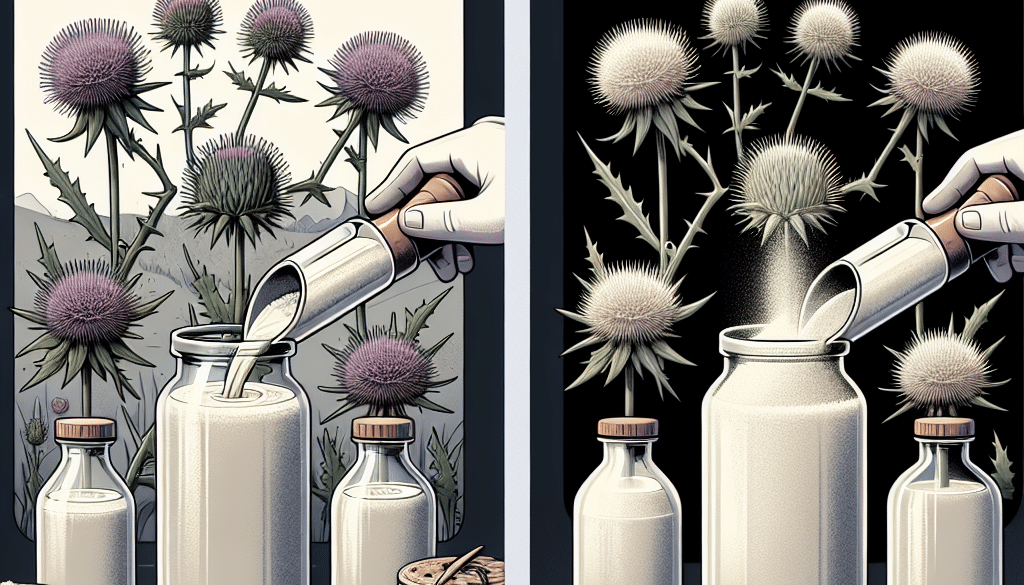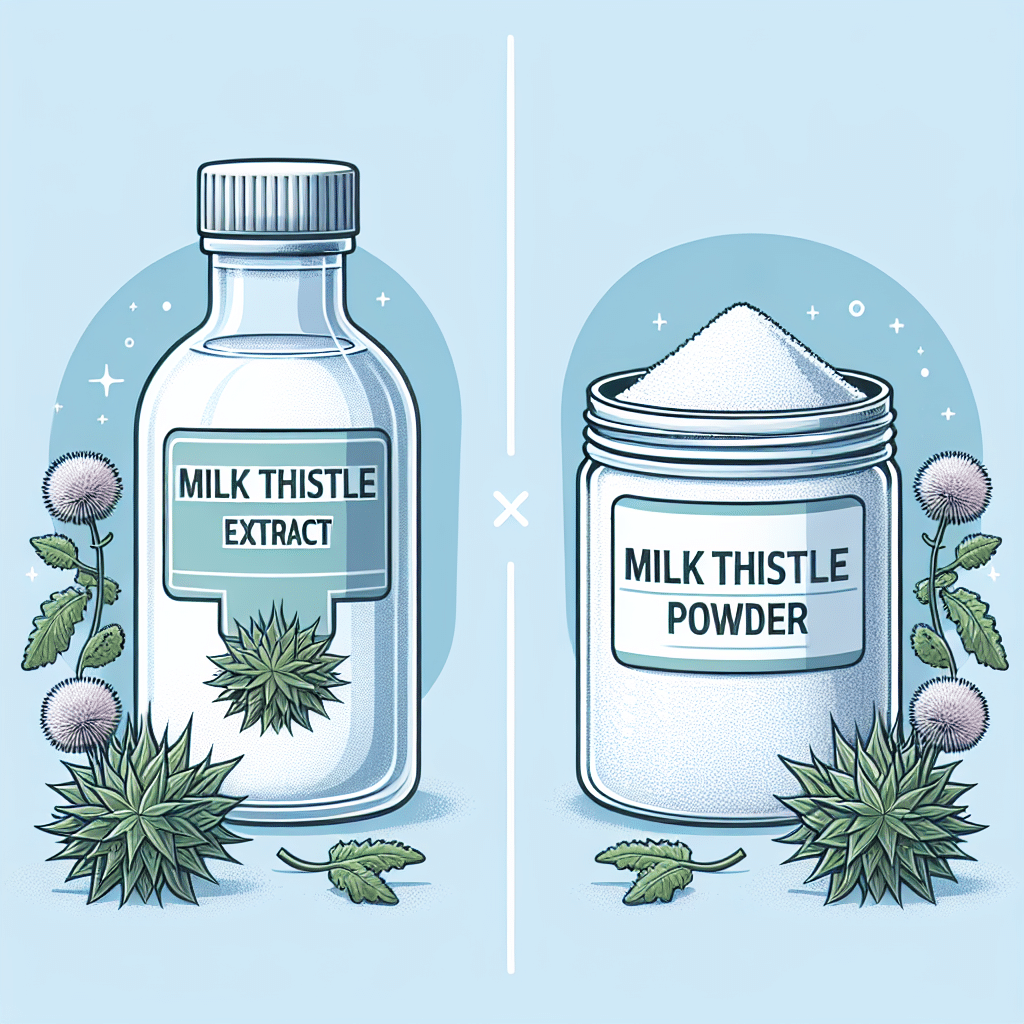Difference Between Milk Thistle Extract and Powder
-
Table of Contents
- Milk Thistle Extract vs. Powder: Understanding the Differences
- What is Milk Thistle?
- Milk Thistle Extract: Potency and Processing
- Milk Thistle Powder: Natural Form and Nutrient Profile
- Comparing Efficacy: Extract vs. Powder
- Case Studies and Research
- Consumer Considerations: Taste, Solubility, and Convenience
- Conclusion: Key Takeaways
- Explore ETchem’s Protein Products
Milk Thistle Extract vs. Powder: Understanding the Differences
Milk thistle, a natural herb with potent antioxidant and anti-inflammatory properties, has been used for centuries to support liver health. Its active ingredient, silymarin, is believed to have hepatoprotective effects, which can aid in the treatment of liver diseases and the detoxification process. As consumers become more health-conscious, they often encounter milk thistle in two main forms: extract and powder. Understanding the differences between these forms is crucial for making an informed decision about supplementation.
What is Milk Thistle?
Milk thistle (Silybum marianum) is a flowering plant native to Mediterranean countries. It has been used in traditional medicine for over 2,000 years, particularly for treating liver and gallbladder disorders. The seeds of the milk thistle plant contain silymarin, a group of compounds said to have antioxidant and anti-inflammatory properties.
Milk Thistle Extract: Potency and Processing
Milk thistle extract is a concentrated form of the active compounds found in the seeds of the plant. The extraction process involves using a solvent, such as alcohol or water, to pull silymarin from the plant material. The resulting liquid is then concentrated and can be standardized to contain a specific percentage of silymarin.
- Standardization: Extracts are often standardized to contain a certain percentage of silymarin, ensuring a consistent dose of the active ingredient in each serving.
- Concentration: Because extracts are concentrated, they typically require a smaller dosage to achieve the desired effect compared to powders.
- Processing: The extraction process can affect the final composition of the product, potentially removing other beneficial compounds found in the whole seed.
Milk Thistle Powder: Natural Form and Nutrient Profile
Milk thistle powder is made by grinding the seeds of the plant into a fine dust. This form maintains more of the natural components of the seeds, including fiber, fatty acids, and proteins, in addition to silymarin.
- Whole Seed Benefits: The powder contains all the natural components of the seed, which may contribute to its health benefits.
- Fiber Content: The presence of fiber in the powder can aid in digestion and promote a healthy gut microbiome.
- Dosage: Powders may require a larger dose to achieve the same level of silymarin found in extracts, due to their lower concentration of active compounds.
Comparing Efficacy: Extract vs. Powder
When it comes to efficacy, the choice between milk thistle extract and powder depends on the desired outcome and individual preferences. Extracts, being more concentrated, may provide a more potent dose of silymarin per serving. However, powders offer a broader range of nutrients due to their less processed nature.
Case Studies and Research
Several studies have investigated the effects of milk thistle on liver health. For instance, a study published in the World Journal of Hepatology found that silymarin had a positive effect on patients with alcoholic liver disease. However, it is important to note that most research focuses on the effects of silymarin rather than comparing the efficacy of extract versus powder.
Consumer Considerations: Taste, Solubility, and Convenience
When choosing between milk thistle extract and powder, consumers should consider factors such as taste, solubility, and convenience. Extracts may have a stronger, more bitter taste but are often available in capsule form, which masks the flavor. Powders can be mixed into foods or beverages but may not dissolve as readily and can have a noticeable texture.
Conclusion: Key Takeaways
In summary, milk thistle extract and powder both offer benefits, but they differ in concentration, nutrient profile, and form. Extracts provide a higher concentration of silymarin and are often standardized, while powders offer a broader range of nutrients and the benefits of whole seeds. The choice between the two should be based on individual health goals, preferences, and considerations such as taste and convenience.
Explore ETchem’s Protein Products
For those interested in enhancing their health regimen, ETchem’s protein products are worth exploring. Their high-quality collagen offerings, including marine, fish, bovine, and chicken collagen, cater to various dietary and health needs. These products are characterized by their neutral taste and instant solubility, making them an excellent addition to any health-conscious individual’s diet.
About ETChem:
ETChem, a reputable Chinese Collagen factory manufacturer and supplier, is renowned for producing, stocking, exporting, and delivering the highest quality collagens. They include marine collagen, fish collagen, bovine collagen, chicken collagen, type I collagen, type II collagen and type III collagen etc. Their offerings, characterized by a neutral taste, instant solubility attributes, cater to a diverse range of industries. They serve nutraceutical, pharmaceutical, cosmeceutical, veterinary, as well as food and beverage finished product distributors, traders, and manufacturers across Europe, USA, Canada, Australia, Thailand, Japan, Korea, Brazil, and Chile, among others.
ETChem specialization includes exporting and delivering tailor-made collagen powder and finished collagen nutritional supplements. Their extensive product range covers sectors like Food and Beverage, Sports Nutrition, Weight Management, Dietary Supplements, Health and Wellness Products, ensuring comprehensive solutions to meet all your protein needs.
As a trusted company by leading global food and beverage brands and Fortune 500 companies, ETChem reinforces China’s reputation in the global arena. For more information or to sample their products, please contact them and email karen(at)et-chem.com today.





